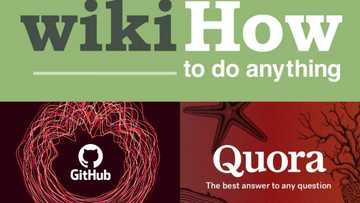How to study and remember: 11 powerful tips to boost your study skills
Everyone who has ever taken an exam is probably familiar with that sinking feeling of looking at a question you are sure you studied but cannot remember the answer. While the brain easily holds onto things you have learned for a while, that information is not always easy to get when needed. This article highlights some of the tips and tricks on how to study and remember.

Source: UGC
TABLE OF CONTENTS
Whether studying for an exam or just trying to retain what you learned in class, remembering what you study can be challenging. Luckily, some secret methods for studying will help boost your recall.
Make your brain more receptive to absorbing new information by caring for your mind and body and working in a good environment.
How to study and remember what you read
Need help remembering the details of what you are studying? Here are 11 memory tricks on how to study fast and remember everything.
Using memory techniques
Utilise these memorisation skills, especially if you are studying for an exam. Learning will be so much easier!
1. Break down the reading material into small pieces
It is easier to process and retain information if you break it into bite-sized chunks. Reading through an entire chapter may end up causing monotony, which results in little or no retention. Therefore, instead of reading through chunks of information, focus on one short section at a time.
This ensures you concentrate and understand each topic more while enjoying the read. If you are studying using a textbook, consider using the book’s structure or table of contents as a guide.

Source: UGC
2. Take notes
Write down important information while listening to a lecture or reading a text. You need not write every detail; you only need to summarise key concepts.
This will not only force your brain to process the data effectively, but it will also condense it to its most essential elements. With this, knowing what key areas to concentrate on during revision is easier.
Nonetheless, avoid typing notes on your keyboard even though it is faster and more convenient. In a 2014 study, researchers Daniel M. Oppenheimer and Pam A. Mueller observed that students who take notes by hand have better retention compared to those did so on laptops.
3. Switch between different topics
Alternating between studying different subjects can help your brain compartmentalise the information more effectively. In addition, switching between entirely unrelated topics ensures your brain can remember quickly. This, in turn, boosts your productivity and concentration.
4. Utilise mnemonic devices
Are you wondering how to study and remember fast? The use of memory cues might work miracles for you. One of the quickest ways to create memories is to develop associations that trigger those memories.
The most common mnemonic device is creating acronyms representing what you try to remember. For example, create an acrostic sentence where the first syllable of each word represents what you are studying.
Consider using images if you are a visual person. In addition, putting information into a melody can also come in handy. This is because music is a powerful memory trigger.

Source: UGC
5. Space out your revision sessions
When you are trying to recall something, repeated exposure is essential. This secret study tip works best if you give yourself breaks between revision times to avoid consuming too much content.
Reviewing after a small break flexes your memory muscles and helps you understand the material more deeply. Use study timer apps like Focused Work and Session to help you schedule your study intervals.
6. Test yourself
As you study each chapter of your book, take breaks to quiz yourself and analyse if you remember what you have read.
Do this by writing questions for yourself, making flash cards or doing the knowledge checks in your textbook. If you are studying with a friend, you can quiz each other.
So the next time you are stranded on how to study and remember for exams, consider quizzing yourself as you will get a better idea of what topics you have understood and the ones that remain unfamiliar.
7. Teach others
Have you ever heard of the saying, when one teaches, two learn? It highlights the mutual benefit of the teaching and learning process. However, to be able to explain a concept to somebody else, you must be able to understand it yourself.
It is vital to summarise the material in a way that is clear and understandable to the next person to avoid sharing misleading information. This allows you to absorb and understand the material better.

Source: UGC
Establishing good habits
To retain what you study, maintaining a healthy lifestyle is vital. Take care of your general well-being by following these tips:
8. Get adequate sleep
Most individuals require 7-9 hours of sleep to be at their best. Getting adequate nighttime not only gives you energy and helps you concentrate, but it also helps you read and remember. Your brain generally processes pieces of information when you are asleep.
It is no wonder that you may understand a difficult concept after a good night’s rest. To develop proper night routines, avoid drinking stimulants such as caffeine and also exercise regularly.
9. Eat a balanced diet
Healthy meals can give you the energy needed to concentrate and remember concepts. Here are foods that help with retention: lean proteins (meat, fish and greens), whole grains, fruits and vegetables.
Additionally, stay hydrated during the day to avoid heat exhaustion. Fats like DHA, available in fish, help improve retention.
Find a proper study environment
An unconducive environment will make it harder to retain what you study. So, before settling down to read, ensure you are in a suitable space.
10. Study in a quiet and comfortable space
Learning in an area with many background noises is difficult. Therefore, find a study place where you will not get distracted by construction sounds or people’s music.

Source: UGC
Also, consider the comfortability of the space to avoid losing focus and getting tired and bored during your reading sessions. You might settle for a library as it is quiet, and you will also have access to multiple research materials.
11. Avoid distractions
It is easy to get side-tracked with easy access to games, social media or movies. Switch off the TV and keep your phone away during your revision.
If you are working on your computer, try a productivity-boosting browser extension like StayFocused to keep you away from time-eating websites.
How to study and never forget
To effectively lodge information in your memory, involve repetition techniques such as flashcards and self-testing. Space out your revision duration, gradually increasing the time between each study session.
How to improve studying memory

Source: UGC
You can improve your retention for studying through practice and healthy overall habits. Focus and interest are essential for effective learning and memorisation.
The above tricks will help you understand how to study and remember; you will be better prepared for your next exam. Nonetheless, remember to make learning a habit (rather than urgency) before the exam to improve your memory skills at a slow and steady rate.
DISCLAIMER: This article is intended for general informational purposes only and does not address individual circumstances. It is not a substitute for professional advice or help and should not be relied on to make decisions of any kind. Any action you take upon the information presented in this article is strictly at your own risk and responsibility!
READ ALSO: How to become a Takealot driver: A quick step-by-step guide
Briefly.co.za highlighted all you need to know about becoming a Takealot driver. You must meet specific requirements to land the job.
Becoming a Takealot driver is one of the best ways to earn money while enjoying flexibility and independence in your work. Check the article for a comprehensive step-by-step guide.
Source: Briefly News








